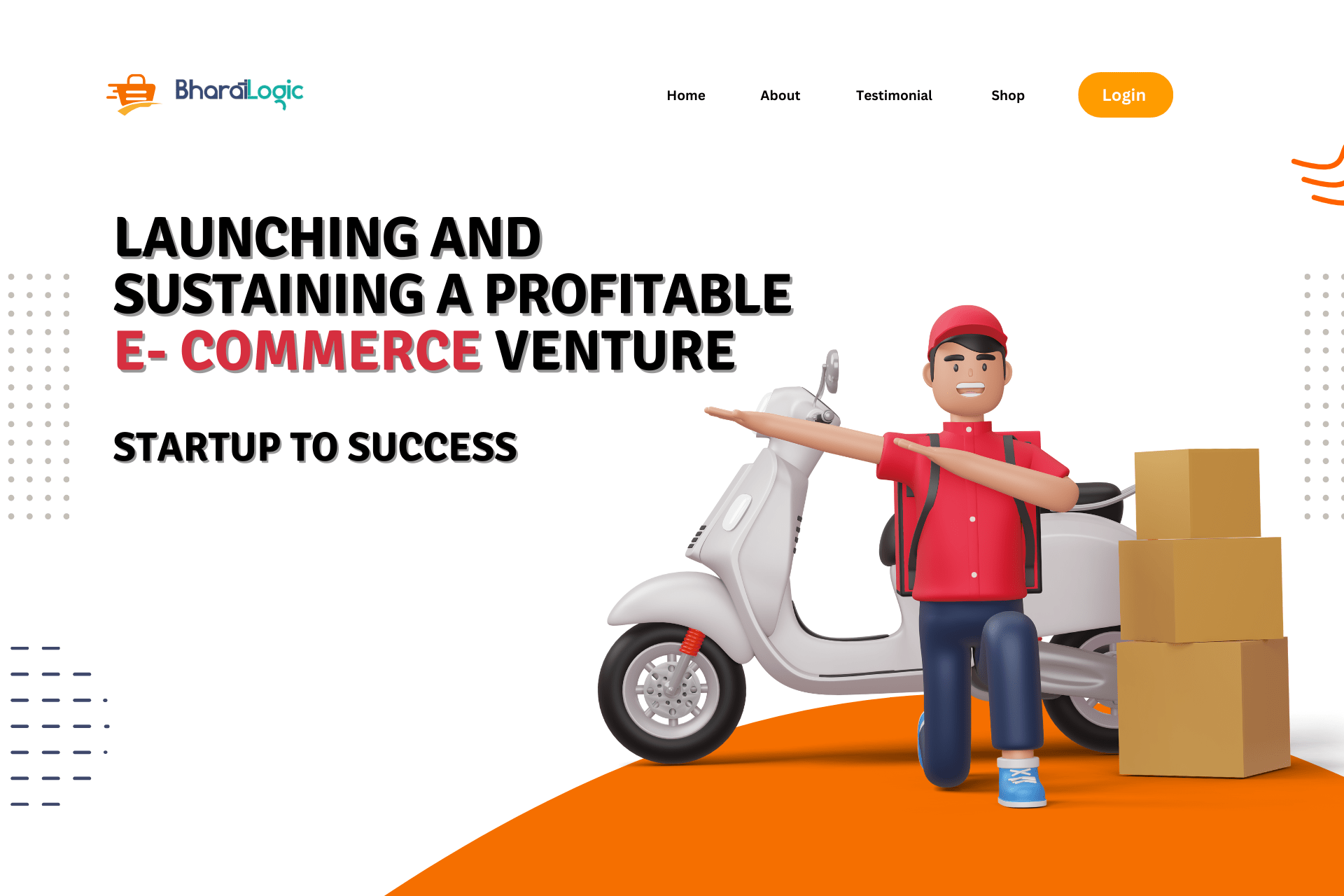Best Ecommerce Platforms for 2024: Features, Pros and Cons
In today’s digital age, having an Ecommerce website brings a host of benefits. It helps you reach a broader audience, enhances your company’s visibility, and boosts your income.
The trend of online sales is on the rise, with projections indicating that almost a quarter of all retail sales will happen online by 2026. This underscores the importance for small businesses to have a web store to stay competitive.
When it comes to Ecommerce platforms, there are several options to consider. Choosing the right platform is crucial, especially when you’re looking to set up an online business and achieve your goals.
Selecting the best Ecommerce platform is a key step in building your online store, but it’s important to note that this process requires time and effort.
In this article, we will provide a brief overview of the best eCommerce platforms, highlighting their key features, structures, advantages, and disadvantages.
What is an Ecommerce Website Builder?

An Ecommerce Website Builder is a tool designed for creating websites with the specific capability to sell products online. These builders come with plans tailored for ecommerce, featuring robust sales functionalities to support the growth and management of your online store.
When selecting a platform for your business, key considerations include scalability, user-friendliness in both the editor and backend dashboard, and the quality of features and tools provided.
It’s important to note that not all website builders are equipped for ecommerce, and not every physical store may desire to establish an online presence. For a more comprehensive solution, businesses seeking a dedicated ecommerce platform might find it better suited to their needs.
What is an Ecommerce Platform?

Ecommerce platforms typically include functionalities such as product listing, inventory management, payment processing, order fulfillment, and security features to ensure a seamless and secure online shopping experience for both merchants and customers. They also provides the necessary tools and features to create, customize, and operate an online store, facilitating the buying and selling of products or services over the internet.
These platforms cater to businesses of different sizes and industries, offering scalability and flexibility. They play a crucial role in establishing and growing an online presence, allowing businesses to reach a wider audience and conduct transactions in the digital marketplace.
Read more : How to start your own Ecommerce Business.
Best Ecommerce Website Builders in 2024

When venturing into the world of ecommerce, selecting the right website builder is paramount for success. Here, we explore some of the best ecommerce website builders, each offering unique features to enhance your online store.
Shopify

Key Features:
-
- User-Friendly Interface: Shopify’s intuitive drag-and-drop interface makes it accessible even for those with limited technical expertise.
- Versatile Themes: A wide array of customizable themes ensures a unique and visually appealing online storefront.
- App Integration: The Shopify App Store offers numerous apps to enhance functionality, from marketing tools to inventory management.
Pros:
-
- Ease of Use: Setting up an online store is quick and straightforward.
- Scalability: Shopify grows with your business, accommodating expansions seamlessly.
- Security: The platform ensures secure transactions, gaining trust from both businesses and customers.
Cons:
-
- Transaction Fees: In addition to subscription fees, transaction fees may apply, impacting profit margins.
- Customization Limits: While highly customizable, some advanced features might require coding knowledge.
Shopify’s strength lies in its balance between simplicity and functionality, making it an excellent choice for entrepreneurs seeking a reliable ecommerce solution.
Wix

Wix, a prominent website builder, extends its prowess to ecommerce, providing businesses with an innovative and visually stunning platform. Launched in 2006, Wix has gained recognition for its versatility and user-friendly approach, making it an appealing choice for businesses venturing into the realm of online commerce.
According to W3Techs, Wix holds a market share of 3.6%, making it the third most popular website building solution after WordPress (63.7%) and Shopify (5.7%).Based on Wix’s official information, there are 238 million Wix users (end of Q3 2022). Wix currently has 6 million premium subscribers, which means only 2.52% of all its users are paying for a premium plan.
Key Features:
-
- Visually Striking Templates: Wix offers a diverse range of professionally designed templates, allowing businesses to create visually appealing online stores.
- Drag-and-Drop Interface: With an intuitive drag-and-drop interface, Wix simplifies the process of customizing layouts, images, and content without requiring extensive technical knowledge.
- App Market Integration: Wix’s App Market provides a plethora of apps to enhance ecommerce functionality, covering aspects from marketing to inventory management.
Pros:
-
- Design Flexibility: Wix’s drag-and-drop interface and customizable templates empower users to craft a unique and visually appealing online store.
- User-Friendly: With a minimal learning curve, Wix caters to both beginners and experienced users, ensuring a seamless ecommerce setup.
- SEO Optimization: Wix equips businesses with tools to optimize their online stores for search engines, enhancing visibility.
Cons:
-
- Learning Curve for Beginners: While user-friendly, newcomers may take a little time to familiarize themselves with the platform.
- Template Switch Limitations: Changing templates might have limitations, urging users to choose their initial design wisely.
Wix combines design flexibility with user-friendly features, making it an excellent choice for businesses aiming to create visually appealing and functional online stores. Its versatile templates and intuitive interface position Wix as a strong contender in the competitive ecommerce landscape.
Squarespace

Squarespace, a renowned website builder, extends its capabilities to ecommerce, offering businesses a platform that seamlessly integrates style and functionality. Since its establishment in 2003, Squarespace has been synonymous with elegant website designs, and its foray into ecommerce maintains this commitment to aesthetics and user experience.
According to the company, there are over 4.4 million live Squarespace websites managed by the 1,800 people who work for Squarespace.
Key Features:
-
- Sophisticated Templates: Squarespace is celebrated for its visually stunning and sophisticated templates, allowing businesses to create a polished and professional online presence.
- All-in-One Platform: From domain registration to website building and ecommerce, Squarespace provides an all-in-one solution, streamlining the process for entrepreneurs.
- Built-in Marketing Tools: Squarespace incorporates marketing tools directly into the platform, facilitating promotion and customer engagement.
Pros:
-
- Design Aesthetics: Squarespace’s templates are designed with a focus on aesthetics, making it an ideal choice for businesses with a strong emphasis on branding.
- All-Inclusive Solution: Squarespace covers various aspects, eliminating the need for third-party integrations and simplifying management for users.
- Mobile Responsiveness: All Squarespace templates are optimized for mobile devices, ensuring a seamless and consistent user experience across platforms.
Cons:
-
- Customization Constraints: While templates are visually appealing, there might be limitations for users seeking highly customized designs.
- Learning Curve: Squarespace may have a slight learning curve for beginners, especially those new to website building.
Squarespace stands as a choice for businesses that prioritize design elegance and seek an integrated platform for website and ecommerce management. Its visually sophisticated templates and built-in tools cater to those aiming to create a distinctive and refined online presence.
BigCommerce

BigCommerce emerges as a robust ecommerce platform, designed to cater to businesses of all sizes with a particular emphasis on scalability and growth. Established in 2009, BigCommerce has evolved into a comprehensive solution that combines powerful features with user-friendly functionalities.
Currently, there are 45,107 live stores operating on the BigCommerce platform. Among these, 15.5% specialize in selling Home & Garden products, while 13.6% focus on Apparel products. Additionally, 6.9% of BigCommerce stores offer Autos & Vehicles products.
Key Features:
-
- Scalability: BigCommerce is geared towards scalability, ensuring that businesses can seamlessly expand their online presence as they grow.
- Multi-Channel Selling: The platform facilitates selling across multiple channels, enabling businesses to reach a broader audience.
- Built-in Security: BigCommerce prioritizes security, providing a secure environment for online transactions and customer data.
Pros:
-
- Scalable Infrastructure: Designed for scalability, BigCommerce accommodates the evolving needs of businesses, from startups to enterprises.
- Multi-Channel Selling: The ability to sell on various platforms expands the reach and potential customer base.
- Performance and Speed: BigCommerce focuses on optimizing performance, ensuring fast-loading and responsive online stores.
Cons:
-
- Cost Consideration: While offering a range of features, the cost structure may be a consideration for small businesses with tight budgets.
- Learning Curve: Users new to ecommerce platforms may experience a learning curve while navigating BigCommerce’s extensive features.
BigCommerce positions itself as an ideal solution for businesses aiming for scalability and a comprehensive set of ecommerce features. Its emphasis on security, multi-channel selling, and performance optimization makes it a competitive choice for businesses aspiring to expand their online presence.
Square Online

Square Online is a dynamic ecommerce platform that simplifies the process of establishing and managing online stores. Launched as part of Square’s suite of business solutions, Square Online is designed to cater to businesses of all sizes, providing an accessible and intuitive platform.
Key Features:
-
- Integrated Payments: Seamlessly integrate Square’s renowned payment processing into your online store for secure and efficient transactions.
- Mobile Optimization: Square Online ensures that your online store is optimized for mobile devices, capturing the growing mobile commerce market.
- Inventory Management: Efficiently manage your inventory with Square Online’s intuitive tools, keeping track of stock levels and product details.
Pros:
-
- User-Friendly Setup: Square Online’s straightforward setup process makes it accessible for businesses without extensive technical expertise.
- Integrated Payments: The integration with Square’s payment processing offers a reliable and trusted transaction solution.
- Mobile-Friendly Design: With mobile optimization, Square Online caters to the increasing number of shoppers using smartphones.
Cons:
-
- Limited Customization: While user-friendly, the platform may have limitations in terms of extensive customization for businesses with unique needs.
- Transaction Fees: Depending on the pricing plan, transaction fees may be incurred, impacting overall costs.
Square Online stands out as a solution that combines ease of use, integrated payments, and mobile optimization, making it a viable option for businesses looking to establish a strong online presence.
GoDaddy

GoDaddy, a well-known name in the web services industry, extends its offerings to ecommerce with a platform that emphasizes simplicity and comprehensive support. Leveraging its reputation for domain registration and hosting, GoDaddy’s ecommerce solution caters to individuals and businesses looking to establish and manage online stores.
Key Features:
-
- Domain Integration: Seamlessly connect your ecommerce store with a domain, leveraging GoDaddy’s domain registration expertise.
- 24/7 Customer Support: GoDaddy prioritizes customer support, providing around-the-clock assistance to address queries and concerns.
- Website Builder: The platform incorporates a user-friendly website builder, allowing users to design and customize their online stores with ease.
Pros:
-
- All-in-One Platform: GoDaddy offers a comprehensive suite of services, from domain registration to ecommerce, streamlining the online business setup process.
- Customer Support: The 24/7 customer support ensures that users can seek assistance whenever needed.
- Website Builder: The intuitive website builder facilitates easy customization for users with varying technical skills.
Cons:
-
- Transaction Fees: Depending on the pricing plan, transaction fees may be applicable, impacting overall costs.
- Advanced Features: Businesses with complex requirements might find that some advanced features are limited compared to specialized ecommerce platforms.
GoDaddy’s ecommerce solution caters to those who prioritize simplicity, an integrated suite of services, and reliable customer support, making it a viable choice for individuals and small to medium-sized businesses entering the online marketplace.
How to Choose an Ecommerce Platform for 2024
Choosing the right ecommerce platform is a critical decision that can significantly impact the success of your online business. With a plethora of options available, each boasting unique features and benefits, it’s essential to navigate this decision-making process wisely. Here’s a comprehensive guide to help you choose the ideal ecommerce platform for 2024.
1. Define Your Business Needs:
- Identify your business requirements, including the scale of your operations, product types, and target audience.
- Determine if you need advanced features such as inventory management, multi-channel selling, or subscription options.
2. Consider Ease of Use:
- Evaluate the platform’s user interface and backend dashboard for simplicity and intuitiveness.
- Opt for a platform that allows easy content management, product additions, and order processing.
3. Scalability Matters:
- Choose an ecommerce platform that can grow with your business. Scalability ensures that the platform accommodates expansions and increased traffic.
4. Examine Features and Tools:
- Assess the quality and range of features offered by each platform, such as payment gateways, security measures, and marketing tools.
- Look for platforms with built-in SEO tools to enhance your online store’s visibility.
5. Check Customization Options:
- Ensure the platform allows for sufficient customization to reflect your brand identity.
- Test the availability of themes and templates that align with your aesthetic preferences.
6. Understand Costs and Fees:
- Consider not only the subscription costs but also transaction fees, shipping costs, and any additional charges.
- Be aware of any limitations on the number of products or monthly transactions based on the pricing plan.
7. Research Customer Support:
- Prioritize platforms with reliable and accessible customer support. Look for options offering 24/7 assistance to address any issues promptly.
8. Trial Periods and Reviews:
- Take advantage of free trials offered by ecommerce platforms to explore their features.
- Read user reviews and testimonials to gain insights into the experiences of businesses similar to yours.
- By carefully considering these factors, you can make an informed decision when selecting an ecommerce platform for 2024. Remember that the ideal platform aligns with your business goals, facilitates seamless operations, and contributes to the overall growth of your online venture.
Keeping up with the latest SEO advancements and trends is crucial in today’s digital age. Are you prepared to incorporate these innovations into your ecommerce marketing strategy? If so, look no further than Bharatlogic, a best digital marketing services company that stays ahead of the curve to outshine the competition and provide clients with impressive websites. Reach out to us today to take your online presence to the next level!
FAQ’s
- Q: Why should I have an eCommerce website?
- A: Having an eCommerce website is crucial in today’s digital age. It broadens your audience reach, enhances your company’s visibility, and significantly boosts your income by tapping into the vast online market.
- Q: How much of retail sales will be online by 2026?
- A: Projections indicate that nearly a quarter of all retail sales will occur online by 2026. This underscores the urgency for small businesses to establish a web store, ensuring competitiveness in the evolving market landscape.
- Q: What should I consider when choosing an eCommerce platform?
- A: When selecting an eCommerce platform, focus on scalability to accommodate business growth, ease of use in both the editor and backend dashboard, a rich set of features, customization options to align with your brand identity, and a clear understanding of associated costs.
- Q: Why is scalability important?
- A: Scalability is vital because it ensures your chosen eCommerce platform can seamlessly grow with your business. This means it can handle expansions, increased website traffic, and evolving needs as your business flourishes.
- Q: What features are crucial for effective online store management?
- A: Key features include robust payment gateways for secure transactions, advanced security measures, marketing tools to promote your products, and built-in SEO tools to enhance the visibility of your online store.
- Q: Why is customization vital for a successful online store?
- A: Customization is essential as it allows your online store to reflect your unique brand identity. Ensure the chosen platform provides customizable themes and templates, enabling you to create a distinctive and visually appealing online presence.
- Q: What costs and fees should I be aware of?
- A: Consider not only subscription costs but also transaction fees, shipping costs, and any additional charges associated with your chosen eCommerce platform. Be aware of limitations based on your selected pricing plan.
- Q: Why is reliable customer support crucial?
- A: Reliable customer support is crucial to address any queries or concerns promptly. Look for platforms offering 24/7 assistance, ensuring smooth operations for your online business.




